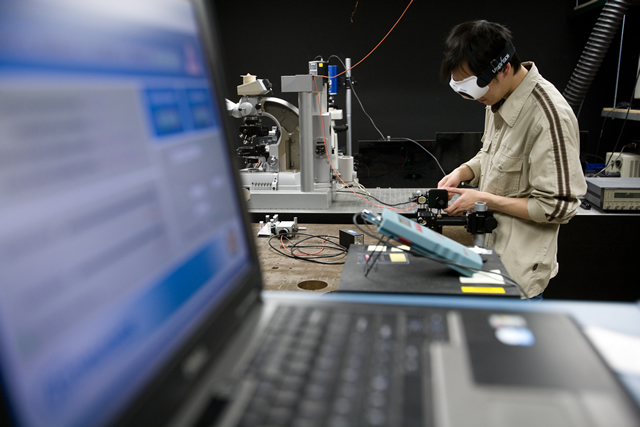
Computer Science ETDs
Publication Date
5-1-2015
Abstract
Interest in swarm robotics, particularly those modeled on biological systems, has been increasing with each passing year. We created the iAnt robot as a platform to test how well an ant-inspired robotic swarm could collect resources in an unmapped environment. Although swarm robotics is still a loosely defined field, one of the included hallmarks is multiple robots cooperating to complete a given task. The use of multiple robots means increased cost for research, scaling often linearly with the number of robots. We set out to create a system with the previously described capabilities while lowering the entry cost by building simple, cheap robots able to operate outside of a dedicated lab environment. Obstacle avoidance has long been a necessary component of robot systems. Avoiding collisions is also a difficult problem and has been studied for many years. As part of moving the iAnt further towards the real-world we needed a method of obstacle avoidance. Our hypothesis is that use of biological methods including evolution, stochastic movements and stygmergic trails into the iAnt Central Place Foraging Algorithm (CPFA) could result in robot behaviors suited to navigating obstacle-filled environments. The result is a modification of the CPFA to include pheromone trails, CPFA-Trails or CPFAT. This thesis first demonstrates the low-cost, simple and robust design of the physical iAnt robot. Secondly we will demonstrate the adaptability of the the system to evolve and succeed in an obstacle-laden environment.
Language
English
Keywords
robot, swarm robotics, ant, genetic algorithm, foraging, obstacle avoidance, biologically inspired, in situ resource utilization, evolution, robot behavior
Document Type
Thesis
Degree Name
Computer Science
Level of Degree
Masters
Department Name
Department of Computer Science
First Committee Member (Chair)
Tapia, Lydia
Second Committee Member
Fierro, Rafael
Project Sponsors
New Mexico Space Grant Consortium NASA Kennedy Space Center
Recommended Citation
Stolleis, Karl. "The Ant and the Trap: Evolution of Ant-Inspired Obstacle Avoidance in a Multi-Agent Robotic System." (2015). https://digitalrepository.unm.edu/cs_etds/70
